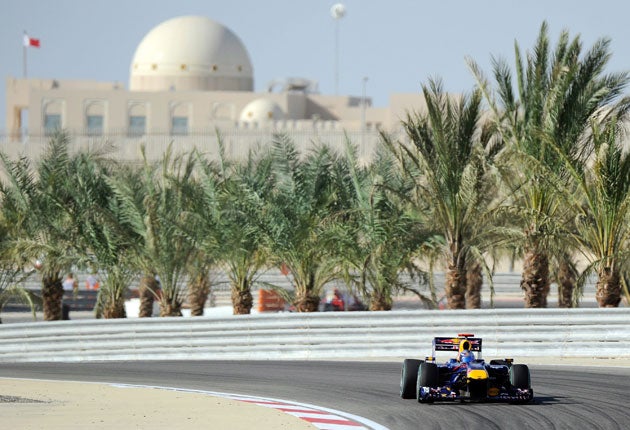Green light for Bahrain proves money trumps ideals
Comment

Your support helps us to tell the story
From reproductive rights to climate change to Big Tech, The Independent is on the ground when the story is developing. Whether it's investigating the financials of Elon Musk's pro-Trump PAC or producing our latest documentary, 'The A Word', which shines a light on the American women fighting for reproductive rights, we know how important it is to parse out the facts from the messaging.
At such a critical moment in US history, we need reporters on the ground. Your donation allows us to keep sending journalists to speak to both sides of the story.
The Independent is trusted by Americans across the entire political spectrum. And unlike many other quality news outlets, we choose not to lock Americans out of our reporting and analysis with paywalls. We believe quality journalism should be available to everyone, paid for by those who can afford it.
Your support makes all the difference.Bernie Ecclestone might have been prepared to stand a $40m [£25.5m] loss if the Bahrain Grand Prix did not go ahead this year, having insisted that any decision would not be based on financial implications.
But it was very definitely about money for the Bahrainis, who pioneered Formula One in the Middle East as a crucial marketing initiative based around highlighting the country's attractions as a "friendly" place to do business.
That image has taken a beating as severe as any dished out to political dissenters since the much-publicised unrest gathered pace there from February onwards, and the tourism industry there is stone dead. Small wonder that a deputation of Bahrainis has been so assiduously courting F1 teams and other interested parties at the past three grands prix in Turkey, Spain and Monaco.
Zayed R Alzayani, the chairman of the Bahrain International Circuit (BIC), claimed in a statement yesterday that the State of National Safety has been lifted and that other countries have withdrawn travel restrictions. He spoke of the event being a source of national pride, but his most telling comments were about the boost it will give a damaged economy. The Bahrain Grand Prix attracts 100,000 visitors, supports 3,000 jobs and generates around $500m of economic benefit. End of story.
If you believed the Bahraini delegation, things have not just returned to a calm state in Manama, but were grossly over-exaggerated by the media in the first place. But video film of atrocities, and reports of medical workers being imprisoned, give the lie to such claims.
At least half of the F1 teams have been wary of a return this year, but after FIA vice-president Carlos Gracia visited Bahrain on 31 May to assess the situation, holding meetings with the Ministry of Interior, the Ministry of Culture and Tourism, the Bahrain Motor Federation and Bahrain International Circuit, as well as Tariq Al Saffar at the National Institute of Human Rights, they were persuaded to revise their views.
Taking advice that the King of Bahrain has established a "political dialogue and reconciliation process", the World Motor Sport Council met in Barcelona yesterday and decided to reinstate the race on the 2011 calendar. It will be held on 30 October, the date originally reserved for India.
Perhaps we should not be surprised; some teams have connections with the Bahrainis, for whom a swift return is crucial to rebuilding their shattered business and tourism industries using F1 as a tool by which to convince a sceptical world all is well.
But should F1 really be going back to a region in which, if news reports are to be believed, a government's agents have been killing its own people? Is endorsement of the ruling regime really the image that F1 should be presenting? It is not long since the sport banned tobacco sponsorship, opening the way for banks, mobile phone, computer and drinks companies to enter a more socially acceptable sponsorship arena.
Call me cynical, but where such big business is concerned I would not have expected any other outcome. Under its current structure F1 will always be the most pragmatic of sports. Money will trump politics – and human rights issues – any time.
Join our commenting forum
Join thought-provoking conversations, follow other Independent readers and see their replies
Comments